Have you ever experienced running your fingers through your hair after a long day and being surprised by several hairs clinging to your fingertips? Does it seem that there is more hair falling out than normal? If it’s been a very stressful time, you may be wondering if this hair loss (or hair shedding) is actually stress related?
Generally speaking, we shed 100-150 hairs per day. When stress starts to build in our busy life, we may experience a higher amount of hair shedding because of that stress.
How Does Stress Cause Hair Shedding?
What is stress?
Stress is a physical and emotional reaction to events of life. Our bodies have developed ways of dealing with stress, both to acute stressors that happen quickly, as well as to chronic stress that is ongoing.
To understand the impact of stress on hair, let’s first go over the four phases of hair growth that every hair on your head goes through:
Four Phases of Hair Growth:
Growth phase (Anagen) – this is the longest phase of the hair cycle, lasting several years. In this phase, the hair grows from the follicle.
Regression phase (Catagen) – the follicle starts to slow down growth and stops getting nourishment from the bloodstream. This phase can last a few weeks.
Resting phase (Telogen) – growth of the follicle has stopped. This phase can last from three months to a year.
Shedding phase (Exogen) – this stage is when the hair falls out, and the next cycle begins.
A healthy hair growth cycle means that your hairs follow this pattern and their regular timing. At any point some hairs on your head are in the Shedding phase of the cycle; therefore, we shed a few hairs every day. It’s all part of the normal hair growth cycle.
How Does Stress Affect Hair Growth?
Stress-related hair shedding means that some hair moves into the telogen phase, or the resting phase, at a time where these normally would not. This is why stress-related hair loss is called “telogen effluvium.” Because the hair follicle is resting when it shouldn’t be, stress changes the typical shedding pattern.
Typically stress-related hair shedding happens a few months after a significant stressful event, usually around 2-3 months later.
Types of Stress that Cause Hair Shedding:
While everybody is different and responds differently to stress, there are often life events that are known to be connected to hair loss due to stress. According to Penn Medicine, these are:
• Illness
• Childbirth
• Surgery
• Emotional stress
What Does Stress-Related Hair Shedding Look Like?
According to the Cleveland Clinic, in general, stress-related hair shedding may appear as all over thinning of hair. However, you may see it more on the top of the head, versus from shedding hairs from the sides or back of the head.
If you have stress-related hair shedding – you may notice more hairs falling out when washing or combing out your hair than usual.
Setting Up Success
The good news is that often as the stress resolves, the hair loss/shedding will resolve as well over the next few months. While stress-related hair shedding may feel overwhelming, your body will take care of it as it can. As much as you can, try not to let worry about stress-related hair shedding increase your stress levels!
Are there things you can do in the meantime? Taking care of your body’s health overall will always help support hair growth and a healthy hair cycle.
Eating a healthy diet full of nutritious foods like fruits, vegetables, nuts, seeds, and lean proteins provides the nutrition that your body systems need. You may find that taking a nutrition hair growth supplement will also help as your body recovers from the stress. These supplements contain specific nutrients that are focused on supporting hair growth.
Ways to help manage your stress:
Just like your hair is unique to you, finding the right way to manage your stress is also going to be specific and special for you. There are a wide variety of things you can try to help manage your stress. Here are some ideas to start with:
• Meditation – is a variety of practices that work by training you, over time, to calm your mind. There are several different types of meditation, which can vary from walking meditations to specific breathing techniques, to types of mindfulness to bring thoughts to the present. There are apps and books that can help teach you how to meditate and help motivate you to stick with it.
• Yoga – based on Indian philosophy, yoga is a series of movements and breathing techniques with longstanding practices behind them. Research suggests that yoga may help reduce stress, but as there are many different types of yoga available, from gentle to athletic, different types may have different benefits. There are yoga studios and yoga classes available online, so there are lots of different ways to try it out.
• Tai chi – is a series of slow gentle movements and specific postures, based on an ancient Chinese martial art. These connected slow movements have been shown to have positive benefits for the body and mind. You can find tai chi classes both in tai chi studios and online.
• Physical activity – for some people, being physically active and using their muscles helps them manage their stress. Whether it’s intense physical activity like long distance running or weight lifting, or more gentle activity like a walk outside or a dance class, regular movement in general can help with stress levels.
• Massage – bodywork like massage, can help some people feel the physical effects of stress melt away. There are many different types of massage from Swedish to deep tissue to reflexology, and it is a very personal choice as to which one will work for you.
• Sleep – getting a good night sleep on a regular basis can help your body manage stress. Sticking to a sleep routine of regularly going to bed and waking up at the same time can help you get enough sleep.
• Gardening – spending time outside in your garden can also help reduce stress levels. Benefits include a mixture of being in nature, working with your hands, and watching the changes happen in your garden. If you don’t have space to garden where you live, many organizations have community gardens that you can take part in. Or you can volunteer to help in the garden of local schools or organizations that would appreciate the help.
• Walk your dog – if you have a dog, spending time playing with them and walking them can help reduce your stress levels. Pet ownership has many benefits for people, and the social connections and stress reductions are just some of them.
There are a variety of techniques to try to help work through stress. Know there are some stresses that will just happen, and we can’t always manage our response. That’s okay, be gentle with yourself that as the stress resolves, your hair loss should resolve as well.
When to See Your Healthcare Professional
If your hair loss remains ongoing, or you feel concerned about your hair shedding, then contact your healthcare professional. They can see if there are other underlying concerns for your hair loss.
You may also want to try a nutrition supplement, like Viviscal Hair Growth Supplements. Viviscal provides a scientifically formulated solution for men and women suffering from fine or thinning hair to achieve, thicker, fuller, and healthy hair in 3 – 6 months.* You can also complement your supplement routine with ViviscalTM hair care products and Exfoliating Scalp Scrub.
Brought to you by the ViviscalTM hair experts.
*These statements have not been evaluated by the Food and Drug Administration. This product is not intended to diagnose, treat, cure or prevent any disease.



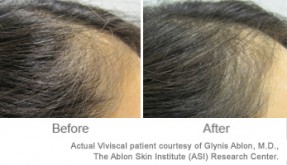
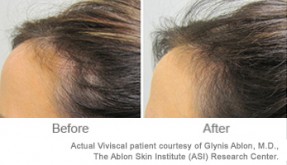
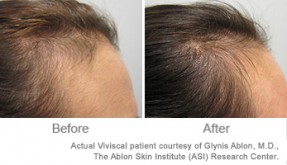
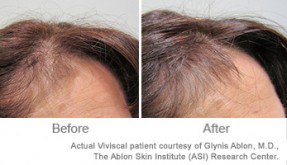
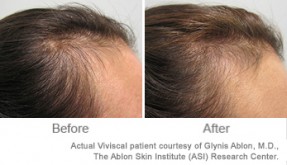
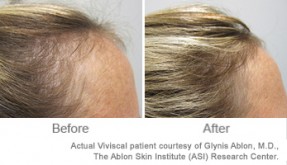
 Instagram us
Instagram us